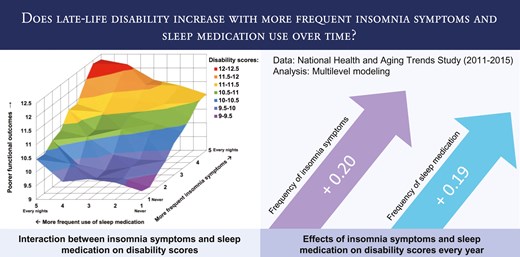2025-04-17 ペンシルベニア州立大学(PennState)
<関連情報>
- https://www.psu.edu/news/health-and-human-development/story/insomnia-and-sleep-medication-use-connected-disability-older
- https://academic.oup.com/sleep/advance-article-abstract/doi/10.1093/sleep/zsaf098/8113190
不眠症状や睡眠薬の使用頻度が長期化すると、晩年期の障害が増加する可能性 Late-life Disability May Increase with More Frequent Insomnia Symptoms and Sleep Medications Use Over Time
Tuo-Yu Chen , Soomi Lee , Orfeu M Buxton
Sleep Published:14 April 2025
DOI:https://doi.org/10.1093/sleep/zsaf098

Graphical Abstract
Abstract
Study Objectives
This study investigated whether disability status increased with the frequency of insomnia symptoms and sleep medication usage over a 5-year period and whether frequent use of sleep medication modified the longitudinal effects of insomnia symptoms on disability among community-dwelling older adults.
Methods
Data were from the National Health and Aging Trends Study (2011-2015; n=6,722). Disability was assessed with a validated disability index. Insomnia symptoms were assessed by the average frequency of longer sleep onset latency and trouble staying asleep. General sleep medication usage frequency was assessed. Multilevel modeling was used to analyze the data, considering health status, demographic information, and risky health behavior.
Results
In the conditional growth model, for every one-unit higher in the frequency of insomnia symptoms and sleep medication usage, disability scores increased by 0.20 (SE = .02, p < .001) and 0.19 (SE = .02, p < .001) every year, respectively, adjusting for covariates. Moreover, the frequency of sleep medication usage influenced the relationship between insomnia symptoms and disability. Specifically, more frequent insomnia symptoms were associated with higher disability scores, and using sleep medications more often led to an even greater increase in disability scores than insomnia symptoms alone.
Conclusions
Disability increased with more frequent insomnia symptoms and more frequent sleep medication usage each year. More frequent sleep medication usage has detrimental implications on disability beyond insomnia symptoms. Treating insomnia and managing sleep medication properly may help prevent disability among older adults.

